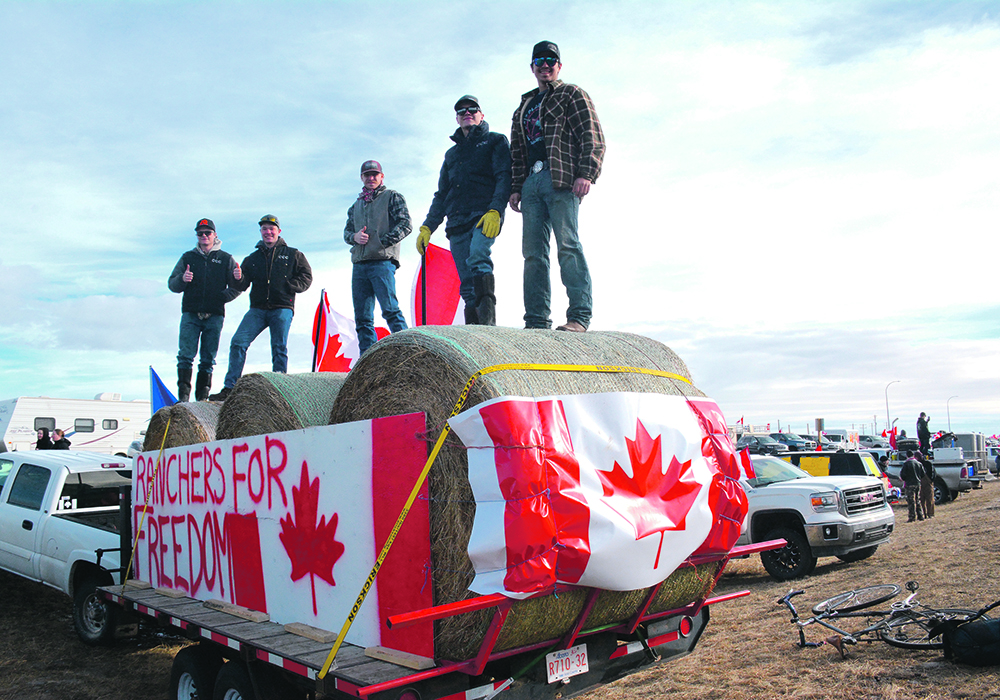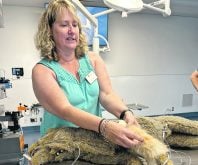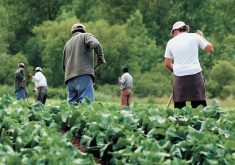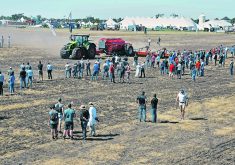The scene in and around the border village of Coutts, Alta., continues to be unstable after more than a week of protest.
The disruption is affecting movement of beef products and live cattle into the industry’s largest export market.
There are calls from beef producer organizations and politicians to end the blockade, and many of those on the front lines of the protest are likely to feel the ramifications of any impediments to the cattle industry.
However, some in the livestock sector, already struggling with a shortage of feed after a prolonged drought, say the sacrifice will be worth it if it results in the province lifting the pandemic restrictions imposed to prevent the spread of COVID-19.
Read Also

Agritechnica Day 2: The future of tractor power, building quicker crop apps and large farms and tech
Agritechnica Day 2: The future of tractor power, building quicker crop apps with Syngenta and large farms and tech
That includes the Connelly brothers, Quin, Liam and Justyn, who make up the fifth generation of ranchers on a ranch near Lundbreck, Alta., 200 kilometres west of the Milk River protest site.
The trio, along with Cole Schweb and Reid Mosby, last week stood atop a trailer packed with round hay bales and festooned with Canadian flags, and with a large sign stating “Ranchers For Freedom” on one side and “Hold the Line, Kenney Resign” on the other.
“It’ll have an impact on us,” said Liam Connelly, as Take Me Home, Country Roads played on a loudspeaker.
“On the packers, feed side of things, they’ve been screwing us over since the existence of the Big Four. We’ve been on the downslope of it the whole time. If the packers get impacted, I don’t think it’s going to be any skin off anybody’s nose.”
Liam said the industry is already backlogged.
“The situation we’ve been put in has been made so much worse by the federal government.”
“ Everybody else has been impacting us, so (the Coutts protest) is just another factor I suppose.”
The initial protest at Coutts began Jan. 29 with a slowing of traffic along Alberta’s Highway 4. A convoy of trucks and tractors later turned into a full blockade that night.
RCMP set up a roadblock outside nearby Milk River to prevent additional supporters from joining what is believed to be a protest led by local farmers and ranchers.
That roadblock was breached by several trucks and tractors on Feb. 1 after RCMP started moving the Coutts protesters out of the village. There was at least one collision as vehicles raced down both sides of the divided highway during deteriorating winter driving conditions.
Since then, the Milk River barrier and Coutts blockade have been closed intermittently by either protesters or police.
The Milk River site became festive last weekend with thousands of supporters joining the protest. However, demonstration leaders outside the Coutts headquarters were far more serious.
The Western Producer attempted to interview the protest leaders on the scene Feb. 4, but that request and others made through different channels got no response. The single individual who did comment was Milk River native Jarrod McCoy.
“I’m here for my kids. I have six kids. I have a reputation on the line,” he said outside Smuggler’s Saloon in Coutts. “It’s worth the risk for freedom. It’s worth the risk to stop unlawful mandates.”
The gravity of the situation at Coutts contrasted with the festive nature of the Milk River site where music, dancing and a buoyant social scene unfolded during the second weekend of the protest. Free food and water were available and protesters could sit on hay bales arranged beside firepits.
Bow Island resident Eva Schmitt brought her seven-year-old son to the Milk River site and encapsulated the sentiment of many at the demonstration.
“It’s amazing,” she said of the show of support. “COVID divided the people but now we are united.”
Bison rancher Jon Taylor was set up near the centre of social activity at the Milk River site while his friend Cory Gerrish served free elk on a bun to anyone who asked.
Taylor said finding feed for his 150 bison in Alberta and 200 in Saskatchewan continues to be a struggle but being part of a movement that he believes will end pandemic restrictions is worth the sacrifice.
“This is short-term pain for long-term gain, and this is what we have to focus on,” said Taylor. “We need to make a stand. It’s going to hurt people a little bit and it’s going to slow things down but at the end of the day, we’re doing it for the long haul.”
While many at the scene say feed and cattle are getting through the border, it’s unclear how it will affect live cattle exports to the U.S. It’s also unclear how the blockade will affect pen space at area feedlots, which was anticipated to increase this month as cattle move through the production chain.
















